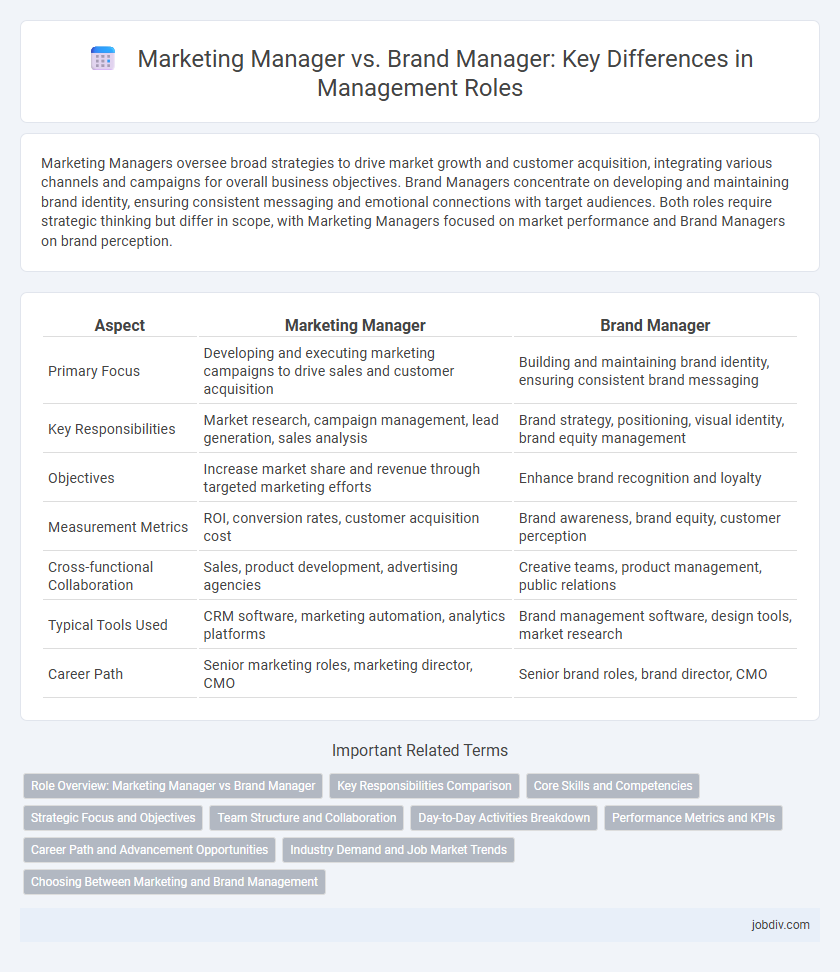Marketing Managers oversee broad strategies to drive market growth and customer acquisition, integrating various channels and campaigns for overall business objectives. Brand Managers concentrate on developing and maintaining brand identity, ensuring consistent messaging and emotional connections with target audiences. Both roles require strategic thinking but differ in scope, with Marketing Managers focused on market performance and Brand Managers on brand perception.
Table of Comparison
| Aspect | Marketing Manager | Brand Manager |
|---|---|---|
| Primary Focus | Developing and executing marketing campaigns to drive sales and customer acquisition | Building and maintaining brand identity, ensuring consistent brand messaging |
| Key Responsibilities | Market research, campaign management, lead generation, sales analysis | Brand strategy, positioning, visual identity, brand equity management |
| Objectives | Increase market share and revenue through targeted marketing efforts | Enhance brand recognition and loyalty |
| Measurement Metrics | ROI, conversion rates, customer acquisition cost | Brand awareness, brand equity, customer perception |
| Cross-functional Collaboration | Sales, product development, advertising agencies | Creative teams, product management, public relations |
| Typical Tools Used | CRM software, marketing automation, analytics platforms | Brand management software, design tools, market research |
| Career Path | Senior marketing roles, marketing director, CMO | Senior brand roles, brand director, CMO |
Role Overview: Marketing Manager vs Brand Manager
Marketing Managers drive overall marketing strategies, focusing on market research, campaign execution, and customer engagement to boost sales and brand awareness. Brand Managers concentrate on developing and maintaining brand identity, ensuring consistent messaging and managing the brand's perception across all channels. Both roles require collaboration but differ in scope, with Marketing Managers overseeing broader market activities while Brand Managers specialize in brand positioning and equity.
Key Responsibilities Comparison
Marketing Managers oversee comprehensive marketing strategies, including market research, campaign development, and performance analysis to drive sales growth. Brand Managers focus specifically on building and maintaining a strong brand identity, managing brand positioning, and ensuring consistent messaging across all channels. Both roles collaborate closely but differ in scope, with Marketing Managers handling broader promotional activities and Brand Managers concentrating on the brand's long-term perception and equity.
Core Skills and Competencies
Marketing Managers excel in data analysis, market research, and campaign execution, leveraging skills in SEO, digital advertising, and customer segmentation to drive sales growth. Brand Managers focus on brand strategy, identity development, and maintaining brand consistency, emphasizing competencies in creative leadership, storytelling, and cross-functional collaboration. Both roles require strategic thinking and communication skills, but Marketing Managers prioritize tactical marketing initiatives while Brand Managers concentrate on long-term brand equity and positioning.
Strategic Focus and Objectives
Marketing Managers prioritize broad market strategies, customer acquisition, and product promotion to maximize sales and market share. Brand Managers concentrate on developing and maintaining the brand identity, ensuring brand consistency, and enhancing long-term brand equity and customer loyalty. Both roles require strategic planning, but Marketing Managers focus on immediate market impact while Brand Managers emphasize sustainable brand growth.
Team Structure and Collaboration
Marketing Managers oversee cross-functional teams integrating sales, product development, and customer service to execute broad campaigns that drive market growth. Brand Managers lead specialized teams focused on brand strategy, creative development, and consumer insights to ensure consistent brand identity across channels. Effective collaboration between Marketing and Brand Managers involves synchronized communication and aligned goals, leveraging data analytics and market research for cohesive campaign execution.
Day-to-Day Activities Breakdown
Marketing Managers oversee campaign planning, market research analysis, and performance tracking to boost product sales and customer engagement. Brand Managers focus on maintaining brand identity through consistent messaging, coordinating with creative teams, and monitoring brand perception in the market. Both roles require collaboration with cross-functional teams, but Marketing Managers emphasize tactical execution while Brand Managers prioritize strategic brand positioning.
Performance Metrics and KPIs
Marketing Managers typically track performance metrics such as customer acquisition cost (CAC), conversion rates, and return on marketing investment (ROMI) to evaluate campaign effectiveness and overall sales growth. Brand Managers prioritize KPIs like brand awareness, brand equity scores, and customer loyalty metrics to measure the strength and perception of the brand in the market. Both roles use analytics tools but align their KPIs to either direct marketing outcomes or long-term brand positioning and customer engagement.
Career Path and Advancement Opportunities
Marketing Managers often progress from roles in sales or market research, gaining broad experience in strategy and campaign management, which prepares them for senior leadership positions such as Marketing Director or Chief Marketing Officer (CMO). Brand Managers typically begin with specialized experience in product development or consumer insights, focusing on brand positioning and identity, with career advancement opportunities leading to roles like Brand Director or Vice President of Brand Strategy. Both paths offer growth potential, but Marketing Managers generally have a wider scope in overall business strategy, while Brand Managers advance deeply within brand-centric roles.
Industry Demand and Job Market Trends
Marketing Managers are in high demand across diverse industries due to their strategic role in driving sales growth and market expansion, with job markets showing consistent growth especially in digital and e-commerce sectors. Brand Managers focus on building and maintaining brand equity, with strong opportunities in consumer goods, luxury products, and FMCG industries where brand differentiation is critical. Emerging trends indicate an increasing preference for professionals skilled in data analytics, digital marketing, and customer experience management in both roles.
Choosing Between Marketing and Brand Management
Choosing between a Marketing Manager and a Brand Manager depends on your focus: Marketing Managers drive overall campaigns, sales strategies, and market research to boost revenue and customer acquisition, while Brand Managers concentrate on long-term brand image, equity, and customer loyalty through consistent messaging and positioning. Marketing Managers require strong analytical skills and adaptability to rapidly changing market conditions, whereas Brand Managers emphasize creativity and strategic thinking to build emotional connections with consumers. Understanding organizational goals and personal strengths in data-driven execution versus strategic brand storytelling guides the optimal management career path.
Marketing Manager vs Brand Manager Infographic

 jobdiv.com
jobdiv.com